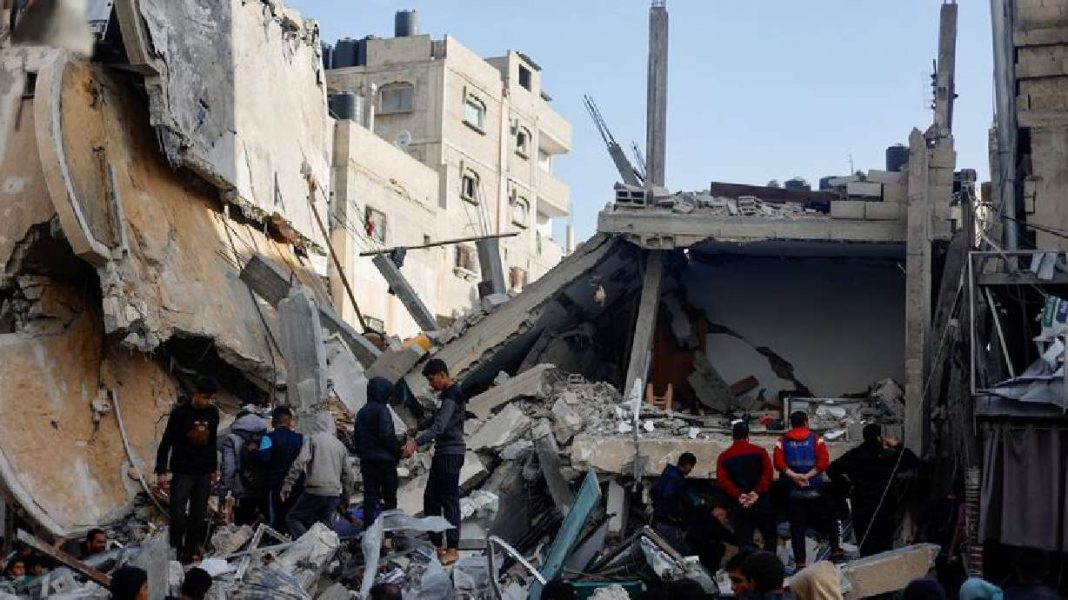CAIRO — Despite Israel’s decision not to send a delegation, Hamas and Egyptian mediators confirmed on Monday that they are persisting with discussions in Cairo to establish a cease-fire in Gaza. The United States reiterated its call for a truce, the liberation of hostages, and a plan to mitigate the humanitarian crisis.
The cease-fire negotiations, which commenced on Sunday, are seen as the last obstacle to achieving the first prolonged cease-fire in the ongoing five-month war. The aim is to have this in place for the Muslim fasting month of Ramadan, which starts on Sunday.
Israel has refrained from making public comments about the Cairo discussions. A source informed Reuters that Israel is abstaining due to Hamas’ refusal to provide a list of hostages captured on Oct. 7 who are still alive. The Palestinian militants controlling Gaza have stated that they will only provide this information once terms have been agreed upon.
“The Cairo talks are continuing into the second day, irrespective of the presence of the occupation’s delegation in Egypt,” a Hamas official informed Reuters.
Two Egyptian security sources confirmed that mediators were communicating with the Israelis, allowing the negotiations to proceed despite their absence.
A Palestinian source close to the talks described the discussions as “tense,” with Israel insisting on a temporary truce to free hostages, while Hamas is seeking guarantees that the war will not resume.
Officials from Hamas, Egypt, and Qatar initiated a second round of talks for the day late on Monday, according to a Hamas source.
In Washington, President Joe Biden’s administration emphasized the necessity of a temporary cease-fire for a hostage deal and encouraged Hamas to accept the current terms on the table.
In a display of the tension between Washington and Israeli Prime Minister Benjamin Netanyahu’s right-wing government, Vice President Kamala Harris hosted Benny Gantz, a longtime political adversary of Netanyahu who joined his war cabinet in a national unity pact at the start of the war, on Monday.
Netanyahu has not received an invitation to Washington since he resumed office a year ago.
Following Harris’ meeting with Gantz, the administration released a statement saying that Harris had discussed the “urgency” of reaching a hostage deal and “expressed her deep concern about the humanitarian conditions in Gaza.”
White House national security spokesman John Kirby told reporters that the United States still hopes to finalize a cease-fire-for-hostages deal by the start of Ramadan, but Hamas has not yet agreed.
“Israel bears a responsibility here to do more,” Kirby said, echoing the unusually strong language Harris used on Sunday.
The proposal under discussion envisages a truce of approximately 40 days, during which militants would release around 40 of the over 100 hostages they are still holding in exchange for some 400 detainees from Israeli jails.
Israel would withdraw from some areas, more humanitarian aid would be permitted into Gaza, and residents would be allowed to return home.
However, the deal does not seem to directly address a Hamas demand for a path to a permanent end to the war. Nor does it resolve the fate of more than half the remaining hostages — Israeli men excluded from both this and earlier agreements covering women, children, the elderly, and the wounded.
Israel asserts that it will not end the war until Hamas is eradicated. Hamas states that it will not release all its hostages without a deal that ends the war.
The Egyptian security sources said mediators were attempting to bridge the gap with guarantees to Hamas on future peace talks and to Israel on the safety of hostages.
A Palestinian official close to the negotiations disputed the U.S. claim that Israel had agreed to the deal and Hamas was holding it up, suggesting this appeared to be an attempt to shift blame to Israel should the talks fail.
Potential Ramadan Truce Could Protect Rafah
The war broke out after Hamas fighters infiltrated Israel on Oct. 7, killing 1,200 people and taking 253 hostages, according to Israeli counts.
Since then, Israel has imposed a blockade on the Palestinian enclave, invaded most of its towns, and subjected it to aerial bombardment. Palestinian authorities report that over 30,000 people have been confirmed dead and most of the population has been rendered homeless. The United Nations warns that hundreds of thousands are facing famine.
A truce during Ramadan could prevent a threatened Israeli attack on Rafah, the town in southern Gaza where more than half the enclave’s population has sought refuge.
However, recent days have seen a significant increase in violence. Residents have reported intense fighting since Saturday just north of Rafah in Khan Younis, and Israeli forces have released video footage showing buildings destroyed in airstrikes.
In Rafah, nightly airstrikes have resulted in the deaths of entire families in their homes. At least 14 bodies were displayed at a hospital morgue in Rafah on Monday morning, with one body bag partially unzipped so grieving relatives could touch a deceased child’s hair.
“I woke up to people collecting bodies. I don’t remember anything,” sobbed Nidal al-Gharib, whose wife was among the dead.
Health officials reported that another Israeli air strike near a hospital in Khan Younis killed 10 people late on Monday.
Violence has also escalated in the Israeli-occupied West Bank, where the Palestinian Authority exercises limited self-rule, having lost control of Gaza to Hamas in 2007.
Israeli forces conducted their largest raid in years into the Palestinian Authority’s administrative capital Ramallah overnight, killing a 16-year-old in a refugee camp, according to Palestinian sources.




Disagree, bad punctuation and grammar.
Disagree, Israelis are a crucial party for peace negotiations.